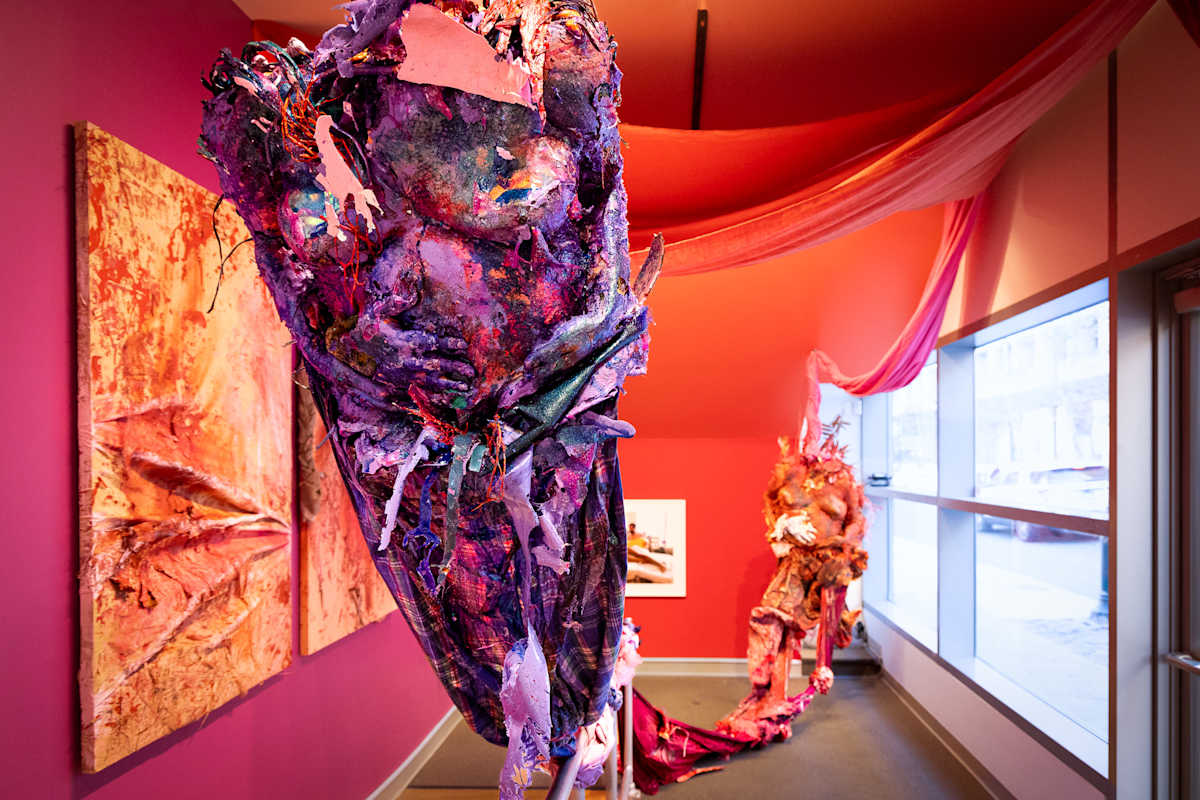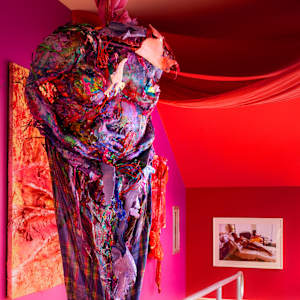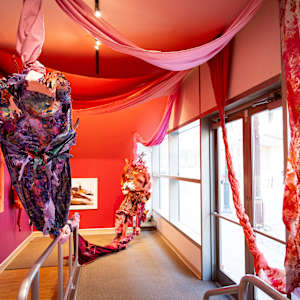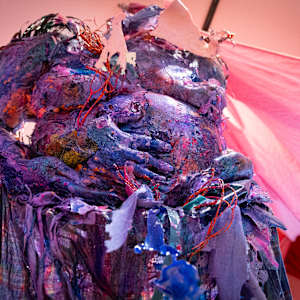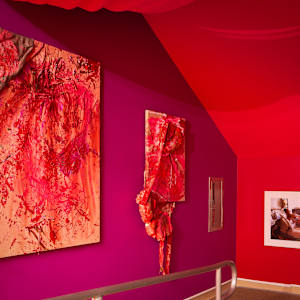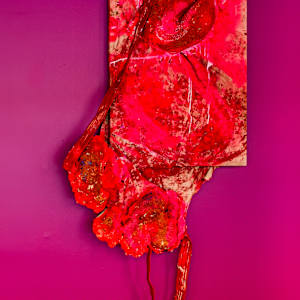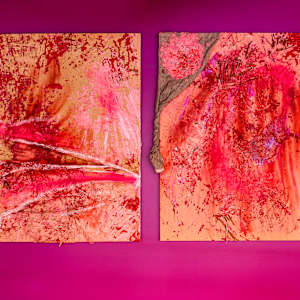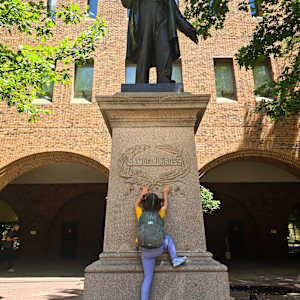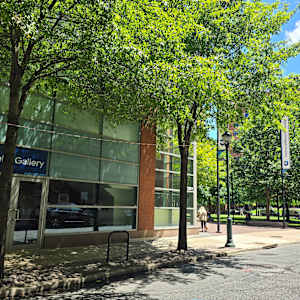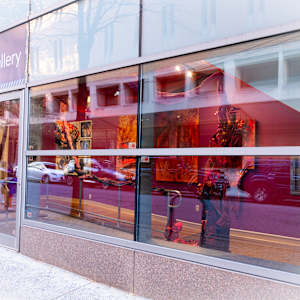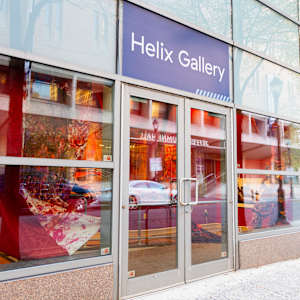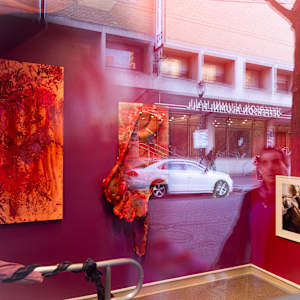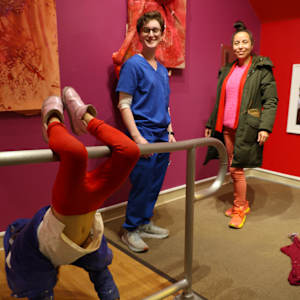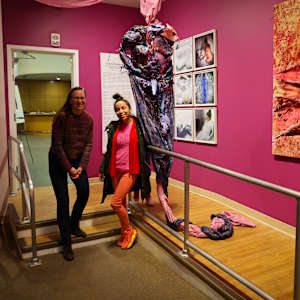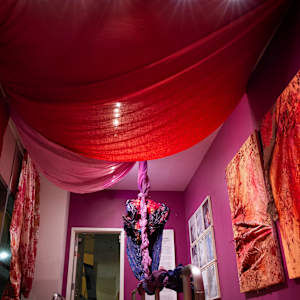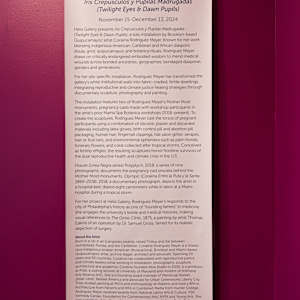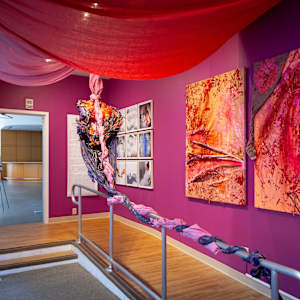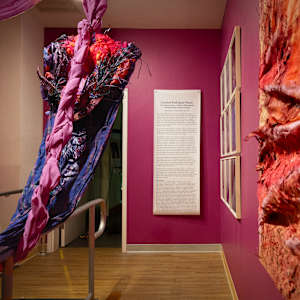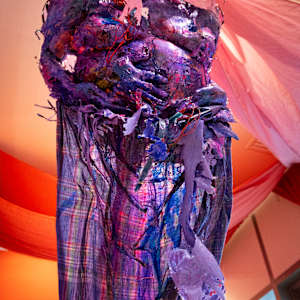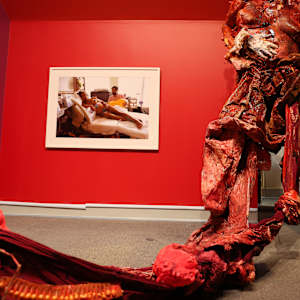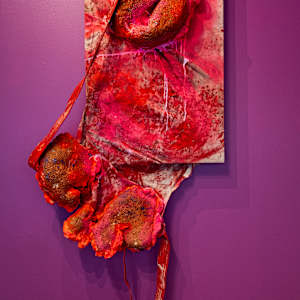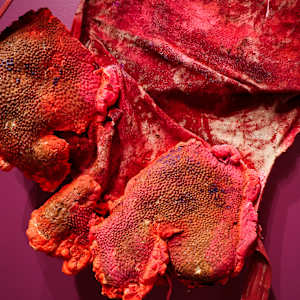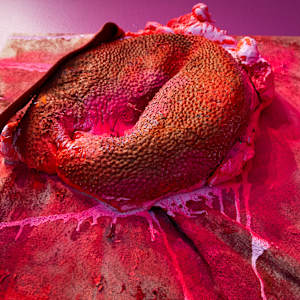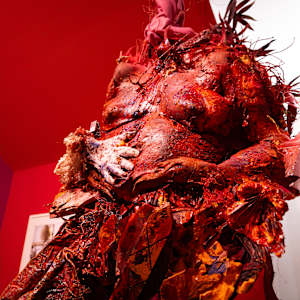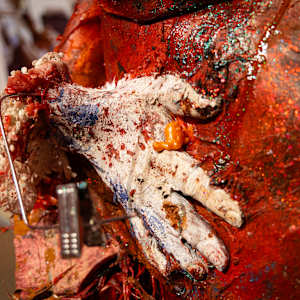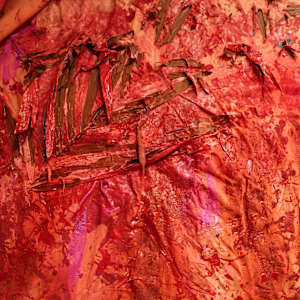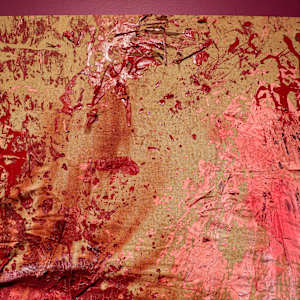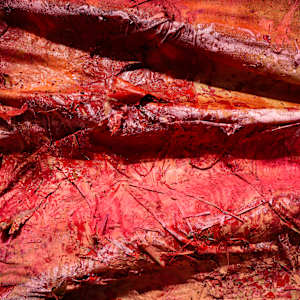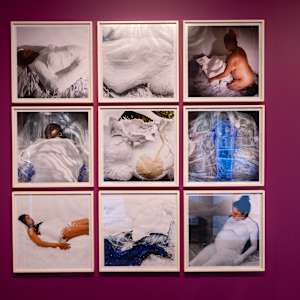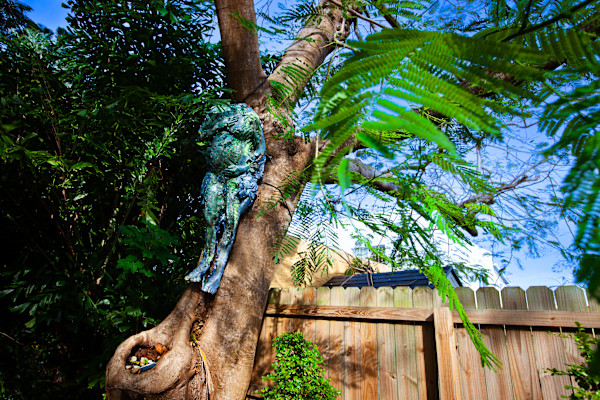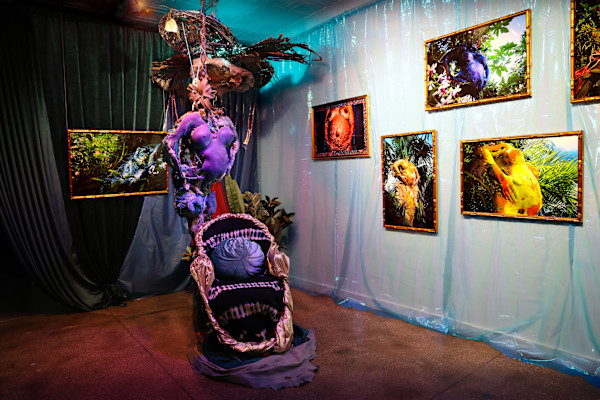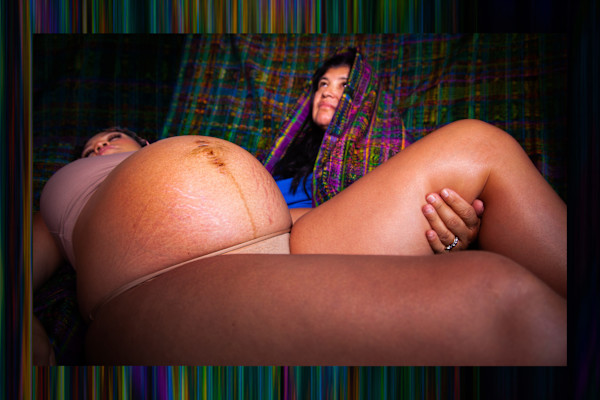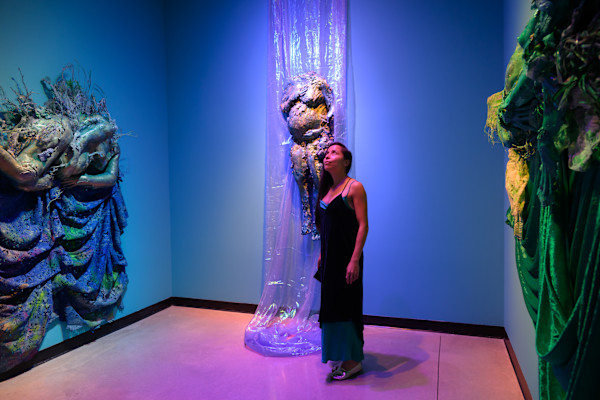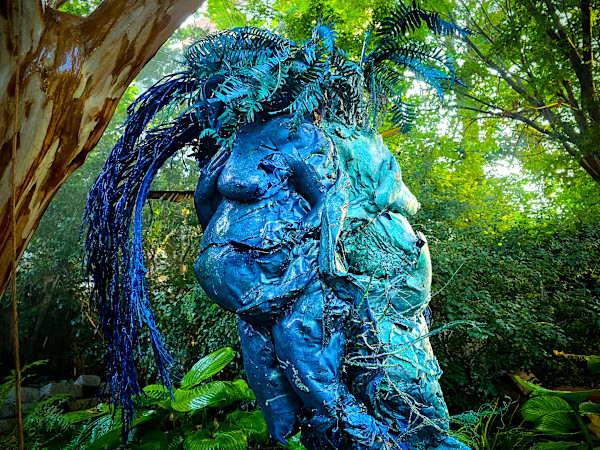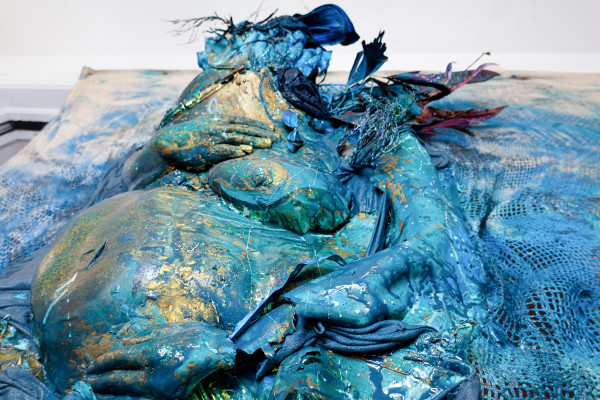Iris Crepusculos y Pupilas Madrugadas
Twilight Eyes & Dawn Pupils
Coralina Rodriguez Meyer solo show
Foliage Obscura retablo installation of Linea Negra photographs & Mother Mold monuments from the Mama Spa Botanica workshop
Curated by Dr Megan Voeller
November 15 - December 13, 2024
Opening Reception Friday November 15, 2024 6-8PM
Closing Reception Friday December 13, 2024 5-7pm
Helix Gallery Thomas Jefferson University
Hamilton Building 1001 Locust Street Philadelphia, PA 19107
Iris Crepusculos y Pupilas Madrugadas I Twilight Eyes & Dawn Pupils
Viewable 24/7 in the Thomas Jefferson University School of Medicine Helix Gallery storefront Iris Crepusculos y Pupilas Madrugadas (Twilight eyes & Dawn Pupils) — is a streetside sanctuary for pedestrians and pupils featuring works from Quipucamayoc artist Coralina Rodriguez Meyer’s Mama Spa Botanica project. An immersive installation mends medical wounds across bonded ancestries, geographies, bondaged diasporas, genders and generations. The works invite witnesses to transform white institutional walls into fabric cradled, fertile dwellings; to integrate reproductive and climate justice healing strategies as resistance technologies in documentary sculpture, photography and painting. Evidence of a transdisciplinary movement lead by doulas, botanicas, healers, griots and advocates, the retablo offers Mother Mold monument fertility effigies, Linea Negra photographs and Foliage Obscura paintings in historic downtown Philadelphia.
Welcoming and warning viewers to the fabled biography of plantation labor farms and pharmacies, the works excavate biological impacts on melanated families whose endangered plantology wisdom transgresses health and habitat disparities. Carnivalesque, tropical landscape cast paintings on domestic drapery fabrics, frame the streetside windows with scintillating vitality within the sterile Modern building. Inviting the witness into a vibrant interior adorned with serapes and Caribbean and Indigenous American matriarchal homes, the works celebrate living rooms and backyard botanicas where it is safer for LGBTQIA+BIPOC families to give birth than in Florida hospitals. Drawn into a psychic interior landscape, a series of botanical, anatomical paintings flank bivalve fertility effigies on adverse ends of the urban surgical theater whose legacy was originally depicted in Thomas Eakins’ Gross Medical Clinic. Emerging from fertility effigies are domestic interior draperies and serapes nesting the viewer in syncretic fabric patterns and Foliage Obscura paintings. Artist Coralina Rodriguez Meyer’s Mama Spa Botanica workshop (2007-present) where the works are made; offers collaborative monuments in documentary sculpture, photography and installation created by, of and for LGBTQIA+BIPOC families and their allies to survive the conflicting climate and reproductive health crisis in America.
The immersive, multisensory tableaux installation offers documentary sculpture, photography, and painting sourced from Philadelphia textile, medical and botanical archives sourced from the university, Philadelphia Museum of Art and . Contextualized in America’s founding father city with the highest concentration of hospitals and public health disparities for melanated families, the kinetic works bond a Miami native’s home to a legacy of structural violence, located in colonial Philadelphia fables. Rendered in 18th - 20th century industrial design, medical technologies, and plantation temperance parables; histrionic expeditions exoticizing the Florida frontier to form an inextricable umbilical cord between American mythology and a pathology of stigmatized fertility and climate crisis.
Mother Mold monuments
Lead by indigenous American, Caribbean and African diaspora doula, griot, quipucamayoc and botanica rituals, the Mother Mold monuments combine pregnancy casts of Mama Spa Botanica workshop participants to build civic agency in integrated diasporic neighborhoods. Transgressing the medical and textile history of Thomas Jefferson University’s industrial manufacturing boom and surgical technologies, the retablo examines the texture and complexion of the American Castas system across Four centuries while preserving mummification rituals of the Chinchorro culture (Chile) 5050 bce. Nesting witnesses within a vibrant ambiance of Mother Mold monuments, the fertility effigies honor frontline survivors of the reproductive health and climate crisis in America. Coralina Rodriguez Meyer’s ongoing multimedia movement in documentary sculpture, photography, painting and community organizing work harnesses LGBTQIA+BIPOC ancestral tradition to resist assimilation.
Mama Spa Botanica offers full spectrum human and habitat care by, of and for the culture. In 2007 Rodriguez Meyer received an infertility diagnosis. Forced to reconcile her late indigenous mother’s birth to her in a car in the Florida Everglades swamp, and her experiences with public health system failures to women of color- the artist hosted her first Mama Spa Botanica workshop to build agency and self care as an extension of community care with her first Linea Negra photo shoot with 2 pregnant, melanated women. Since then the artist has held dozens of workshops in collaboration with neighbors, reproductive justice leaders and environmental advocates such as griot/doula Nicky Dawkins (founder, director Menstrual Market). Ranging from members of medical institutions, clinics, academia, activism, herbalism, curandero farming, community health, and environmental justice fields; the workshops offer dignity training and cultural medicine sanctuaries to her low income, immigrant, LGBTQIA+ BIPOC neighbors. Offering critically endangered embodied wisdom resources from Indigenous American practices of mummification from the Andes to Creole fertility rituals of the Caribbean- the Linea Negra photographs, Mother Mold monuments and Foliage Obscura retablos aim to increase visibility of structural violence in reproductive and environmental health by translating fertility effigy statues into equitable statutes.
Evolving from documentary photography in 2007 to documentary sculpture in 2018, the artist’s practice draws on the cultural practices of her genetic origins across continents ranging from the Americas, Africa, Europe and the South Pacific. 2000 years before the carbon date of Egyptian mummies, Andean Chinchorros culture in 5050 bce embalmed the remains of desiccated Huacas mummies to cohabitate with fertility, birthing, and afterlife traditions. Combining indigenous American mummification rituals and Carnival aesthetics with American vernacular belly casting, the works cultivate matriarchal currencies and historic kinships predating colonization. Current self-care rituals, (moisturizing, rubbing, preserving, embalming and tinctures) and ancient mummification serve as syncretic survival strategies in integrated chosen and inherited family structures. Preceding Death Masks during the French Revolution, the haptic mementos repair bonds between birthing people and their kin as a celebration of the Cuarentena tradition. The Mother Mold monumental sculptures venerate fertility effigies and mummies as the oldest art form in colorful contrast to an antiseptic history museum tableaux format.
To create the Mother Mold monuments, the artist casts intimate waste, environmental ephemera with a slurry of domestic construction materials into a silicone and plaster Mother Mold of pregnant participants. A compound of refuse materials such as discarded medical latex gloves, birth control pill & abortion pill packaging, human hair, fingernail clippings, nail salon glitter, serapes, hair or fruit nets, bind the environmental ephemera such as palm fronds, funerary flowers, coral collected after tropical storms and other washed up debris is cast into a kinetic figure. Like the death masks made by French Revolutionaries—head casts of guillotined aristocrats—paraded around the streets to prove the possibility of democracy, Coralina Rodriguez Meyer’s Mother Mold monuments and Foliage Obscura retablos serve as extants preserving matriarchal interdependence structures.
Exhibition Walk through
https://youtu.be/c0vYufFXR9U?si=s5HovO0gP-O_VGTz
https://www.jefferson.edu/life-at-jefferson/student-resources-services/humanities-health/programs/helix-gallery.html
- Subject Matter: photography, sculpture, painting installation, Landscape, Pregnant Figure, Monument, Effigy, Memento, Relief
- Collections: Exhibitions

